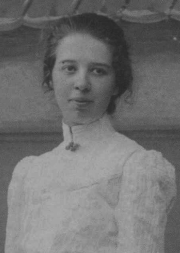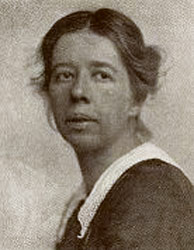Clara Gertrud Wichmann
Clara Gertrud Wichmann , also known as Clara Meijer-Wichmann , (born August 17, 1885 in Hamburg , † February 15, 1922 in The Hague ) was a German lawyer , journalist , pacifist and representative of anarcho-syndicalism .
Life
Born in Hamburg, Clara Wichmann spent most of her life in the Netherlands . She was the daughter of Arthur Wichmann , university professor of mineralogy and geology , and of Johanna Theresa Henriette Zeise (1852-1938) and the sister of the artist Erich Wichmann (1890-1929). Clara Wichmann was active as a student in the feminist movement and worked in the Comité Misdaad en Straf (“Committee for Crime and Punishment”), in which Hendrik Ebo Kaspers was also active. She advocated women's suffrage , non-violence and a fair criminal justice system. Since 1921 she was married to Jonas Benjamin Meijer (1895–1969). In 1902 she attended lectures on philosophy and got to know the work of Georg Wilhelm Friedrich Hegel , whose way of thinking she accepted, but rejected his "socially conservative interpretation" (quote from Mieke Rimmelzwaan. IISG). The seminars she attended grew her interest in history and philosophy. Between 1903 and 1905 she prepared for her state examination for high school classes and then studied law . Two years later, Wichmann was elected President of the Utrechtsche Vrouwelijke Studenten Vereeniging ("Student Association for Women in Utrecht").
Act

For her state examination she wrote a dissertation under the title, Beschouwingen over de Historische Grondslagen der tegenwoordige omvorming van het Strafbegrip ("Considerations on the historical foundations of the current transformation of the concept of criminal law"). Wichmann opened a law firm for a short time in her parents' house. In 1913 she worked for a short time as deputy director at the Amsterdamse School voor Maatschappelijk Werk ("Amsterdam School for Social Work"). In March 1914 she found a permanent position at the Centraal Bureau voor de Statistiek ("Main Office for Statistics"). In 1916 she became head of the criminology department there . Through her work she came to the conviction that “crime is a product of certain social conditions” (quote from Mieke Rimmelzwaan; IISG). Wichmann was involved as a co-founder in the spring of 1916 at the "School of Philosophy" and gave lectures on the theory of socialism . She came to the conviction that in a society there was no place for a form of government, regardless of the ideology of rule. In 1917 she became a member of the Alliance of Christian Socialists (BCS). Their concern was anti-militarism , not Christian belief. Due to internal disputes, she soon gave up her membership again and founded the League of Revolutionary Socialist Intellectuals . On May 8, 1920 Wichmann was also involved in the founding of the Alliance of Religious Anarcho-Communists (BRAC) , among others with Lodewijk van Mierop .
Their motivation was non-violent resistance against state power and for an anarchist society. In her four articles on The Theory of Syndicalism (in the magazine Nieuwe Amsterdammer , June and July 1920) she took a political stance and opted for anarcho-syndicalism. "Your anarchist ideas can best be described by combining the titles of your two articles: 'The Liberation of Man and Society'."
She was a pioneer of the animal rights movement by writing a discussion on the status of animals in human society in 1920; she compared this to the situation of slaves and women. That is why it is seen as a forerunner of a politically understood anti-speciesism . She called for animals to be recognized as beings with their own rights and, as she wrote in her essay, wanted "a transformation of the old habit of viewing animals as something given to Adam in order to derive profit and convenience from it." The author Renate Brucker complains that this aspect of her thinking, "which for you, Clara Wichmann herself, was not entirely insignificant", is not being appreciated enough.
Wichmann had great influence in the anti-militarist and libertarian-socialist movements of her time, among others Bart de Ligt came into contact with her. In principle, she was against any form of dictatorship and the “one-sided thinking of friend and foe” (quote from Mieke Rimmelzwaan, IISG). Through her law degree, she was convinced that prison sentences could not prevent crime. In many articles she advocated a radical, humane change in criminal law. Only then, so they believe, if society overcomes capitalism, competition and the pursuit of financial gain, would a large part of economic crime be banned. Appropriate means should be used to respond to violent and sexual crimes. In order for fundamental changes to take place, among other things in the criminal laws and for the prevention of crimes, it would be necessary to change the capitalist production and property relations into socialist ones (cf. the anarchist multimedia De Vrije ).
In addition to numerous published articles, she had actively worked as a co-founder and member of the editorial board of various magazines, including in 1911 in the editorial team of “Die Frau, Geschichte und Soziologie” as an editorial member of the monthly Maandblad voor Vrouwenstudie (“Monthly magazine for women's studies”). She was represented with publications in Tijdschrift voor Wijsbegeerte ("Journal of Philosophy") and De Vrije Communist ("The Free Communist", 1920; editors were Christiaan Cornelissen and Lodewijk van Mierop).
At the age of 36, Clara Wichmann died shortly after the birth of her daughter Hetty Passchier-Meijer. The Clara Wichmann Institute named after her (from 1987 to 2004) campaigned for women's rights . Since 1988, the Clara Meijer-Wichmann Prize has been awarded annually on December 10th by the League for Human Rights.
Works (selection)
- Vrouw en Maatschappij . Publishing house Bijleveld, Utrecht 1936
- The cruelty of the prevailing view of crime and punishment . Verlag Der Freie Arbeiter, 1922
- From revolutionary vigor. Contributions to emancipation movements 1917–1922 . Edited by Renate Brucker, Verlag Graswurzelrevolution, Heidelberg 2018, ISBN 978-3-939045-33-5 .
further reading
- E. Smolenaars: Passie voor Vrijheid. Clara Wichmann (1885-1922) . Aksant Verlag, Amsterdam 2005, ISBN 90-5260-173-9 .
- D. de Lange jr .: Clara Wichmann . In: De Communist Gids. 1922, pp. 209-218.
- Bart de Ligt: Clara Meijer-Wichmann as the most condemned of the Menschelijkheid . Amsterdam 1933.
- H. Roland Holst: Clara Meijer-Wichmann herdacht . Rotterdam 1932.
- Arthur Lehning : Prometheus en het right van opstand ; Chapter: Clara Wichmann, criminologe en anarchy. Pp. 46-53. Baarn (Netherlands) 1987.
- Gernot Jochheim (Ed.): Clara Wichmann - The Path of Liberation (texts about active non-violence 1917–1921), Verlag Weber & Zucht , Kassel 1989. ISBN 3-88713-035-9 .
- Renate Brucker: Clara Wichmann on the legal status of animals . In: Leo Tolstoi , Clara Wichmann, Elisée Reclus , Magnus Schwantje and others: End the slaughter! On the criticism of violence against animals. Anarchist, feminist, pacifist and left socialist traditions . Verlag Graswurzelrevolution, Heidelberg 2010, ISBN 978-3-939045-13-7 , pp. 123-134.
Web links
- Literature by and about Clara Gertrud Wichmann in the catalog of the German National Library
- Short biography (on calendar sheet November) (PDF file; 930 kB)
- Clara Wichmann-archief . In the Marxist Internet-Archief .
Individual evidence
- ↑ Short biography of Clara G. Wichmeijer in Dutch. Retrieved February 18, 2009
- ↑ Informative article about CG Wichmann in the "Anarchist Multimedium" ( Memento of the original from March 4, 2016 in the Internet Archive ) Info: The archive link was automatically inserted and not yet checked. Please check the original and archive link according to the instructions and then remove this notice. De Vrije ; Dutch. Retrieved February 18, 2009
- ↑ Biography of CG Wichmann. Author: Mieke Rimmelzwaan Last modified on June 5, 2002. Published in: Biographical Woordenboek van het Sozialisme en de Arbeiders Moving in Nederland (BWSA), pp. 179–183; at the International Institute for Social History (ISSG); Dutch. Retrieved February 24, 2009
- ↑ (PDF; 321 kB) Quote from Suzette Haakma ( page no longer available , search in web archives ) Info: The link was automatically marked as defective. Please check the link according to the instructions and then remove this notice. Dutch. Retrieved February 24, 2009
- ↑ quoted from: Matthias Rude: Antispeziesmus. The liberation of humans and animals in the animal rights movement and the left. Stuttgart 2013, p. 106.
- ↑ Renate Brucker (eds.): Leo Tolstoi, Clara Wichmann, Elisée Reclus, Magnus Schwantje u. a .: End the slaughter! On the criticism of violence against animals. Anarchist, feminist, pacifist and left socialist traditions. Heidelberg 2010, p. 126.
- ^ Short biography at the International Institute for Social History With extensive archive material, letters, documents. Dutch. Retrieved March 2, 2009
- ^ Clara Meijer-Wichmann Penning . Dutch, accessed August 29, 2012
| personal data | |
|---|---|
| SURNAME | Wichmann, Clara Gertrud |
| ALTERNATIVE NAMES | Meijer-Wichmann, Clara |
| BRIEF DESCRIPTION | German publicist and anarcho-syndicalist |
| DATE OF BIRTH | 17th August 1885 |
| PLACE OF BIRTH | Hamburg |
| DATE OF DEATH | February 15, 1922 |
| Place of death | The hague |

